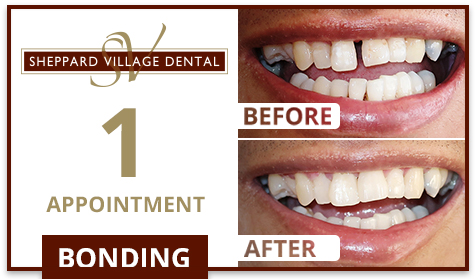

What Is Dental Bonding?
What are the differences between dental bonding and other available options?
When exploring ways to repair your teeth or enhance your smile, there are numerous treatments to consider, each suited to different needs. We are eager to offer a detailed exploration of all the options during your visit, explaining the benefits and drawbacks of each.
Here are some benefits of dental bonding that you might want to keep in mind:
Quick and painless
Low upfront cost
Great for small repairs
The Dental Bonding Process
Whether you opt for dental bonding to repair damage or enhance your smile cosmetically, the procedure stays the same.
Here is what to expect at your dental bonding session:
Preparing the tooth
Applying the composite resin
Finishing touches
Cost Of A Dental Bonding
Contact us today
to schedule an initial consultation & exam.
Your consultation will include an examination of everything from your teeth, gums and soft tissues to the shape and condition of your bite. Generally, we want to see how your whole mouth looks and functions. Before we plan your treatment we want to know everything about the health and aesthetic of your smile, and, most importantly, what you want to achieve so we can help you get there.
Frequently Asked Questions
Dental bonding can successfully correct tooth discoloration by applying composite resin to the discolored teeth, enhancing their look and achieving a more consistent color.
Yes, dental bonding is a highly effective method for fixing small tooth fractures. The composite resin is applied directly to the broken area, which helps restore the tooth’s structure and improves its visual appearance.
Although dental bonding is a flexible treatment, it might not be the best choice for significant repairs or substantial alterations to teeth. For more extensive needs, other options such as dental veneers or dental crowns might be more appropriate.
Absolutely, dental bonding is an effective method for reshaping teeth. Dentists can adjust the shape and contour of teeth by skillfully applying and sculpting composite resin, enhancing their aesthetic appeal.
The length of time needed for dental bonding varies based on how many teeth are involved. Typically, bonding a single tooth can be accomplished within one dental appointment, often taking about an hour or two.







